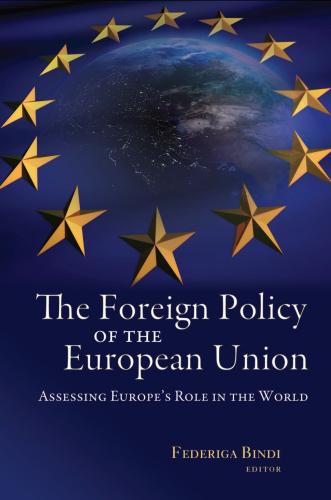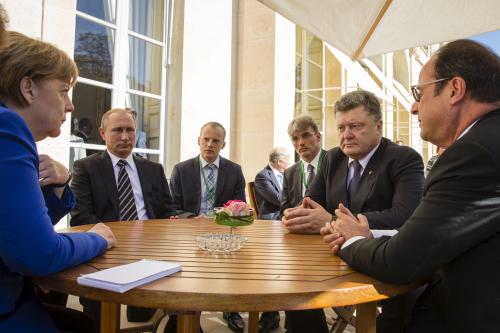Donald Trump’s victory in the November 8 presidential election stunned many in Europe—just as it stunned many Americans, perhaps including Mr. Trump himself. When I visited Germany last week, I heard nervous questions about what a Trump presidency will mean for U.S. policy toward Europe, in particular as regards NATO and the Ukraine-Russia conflict.
During his campaign, Mr. Trump offered an America-first approach that implied a reduction in the global role the United States will play. He questioned the value, or at least the terms, of America’s alliances, including NATO.
Mr. Trump also raised the possibility that he would recognize Russia’s illegal annexation of Crimea, which would align the United States with a small handful of countries such as Nicaragua, North Korea, and Syria. He suggested he would lift sanctions on Russia and build a better relationship with Moscow, but he did not seem particularly interested in getting the Kremlin to correct some of its problematic actions that have reduced West-Russia relations to their lowest point in more than 25 years.
No wonder Europeans are worried. So am I.
If Mr. Trump follows through on these points, it will mean a major departure from the approach toward Europe followed by every president—Democratic or Republican—since Harry Truman. No wonder Europeans are worried. So am I.
But worry is not a policy. Here are a few suggestions for how Europeans might deal with the coming Trump presidency.
First, do not assume the worst. Look for ways, even during the transition, to engage Mr. Trump and his team and try to shape their views to support U.S. engagement and trans-Atlantic cooperation. You will have allies in Washington. Republicans in Congress, the vice president-elect, and virtually all names mentioned for secretary of state and secretary of defense support NATO, want to assist Ukraine, and are wary of the Kremlin.
One caution, however. Don’t push for big decisions early on. As Mr. Trump gains experience on foreign policy, he may—may, not will—come to rely less on his instincts and more on the counsel of his cabinet. That could produce better U.S. policy.
Second, Europe needs to boost its defense spending. Going back to at least the 1970s, senior U.S. officials have called on European members of NATO to meet alliance defense spending targets (usually measured as a percentage of gross domestic product). They got nods of agreement and pledges in NATO summit communiqués…but later they again had to call on European members to meet the spending targets.
Money should not be the sole measure of being a good ally. NATO’s Article 5—which commits allies to consider an attack on one as an attack on all—has been invoked only once in the alliance’s 67-year history: in defense of the United States, following the September 11, 2001 terror attacks. Since then, more than 1,000 soldiers from NATO countries have died in Afghanistan fighting alongside U.S. troops.
But allies would ignore defense spending at NATO’s peril. As my colleague, Tom Wright, has noted, one of the few consistent foreign policy views that Mr. Trump has held—for 30 years—is that allies free ride on U.S. defense expenditures. You need to do more.
Third, do not waste time on the Trans-Atlantic Trade and Investment Partnership (TTIP). A second view that Mr. Trump has held for decades is that multilateral trade deals disadvantage the United States. He is wrong on that, but he has said that on his first day in the Oval Office he will withdraw America from the Trans-Pacific Partnership (TPP). That, unfortunately, will leave the door open for China to define the trading rules in the world’s most dynamic economic region. If Mr. Trump kills TPP, there is no reason to think that he will go along with TTIP.
Fourth, as much as possible, shape a unified European voice and show that the European Union can be a robust partner in tackling the challenges that confront both sides of the Atlantic. Mr. Trump does not appear to have much appreciation for nuance. A Europe that engages him in four or five different national voices will not command the attention of a Europe that speaks as one.
Finally, there is a lot going on in the European Union in 2017: elections in France, the Netherlands, and Germany; rising populist movements; the refugee crisis; economic woes; Brexit, and more. While addressing these questions, EU leaders also need to carve out time to shape proactive policies to deal with external challenges if they want to capture Mr. Trump’s interest and engagement.









Commentary
Advice for Europe on dealing with President Trump
November 30, 2016